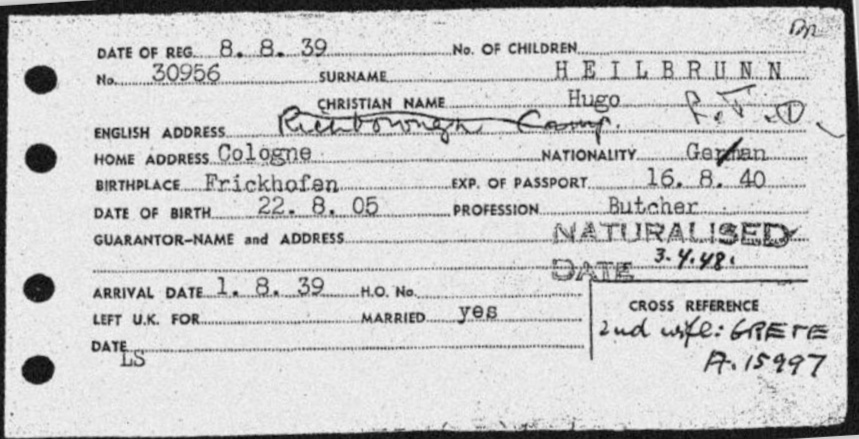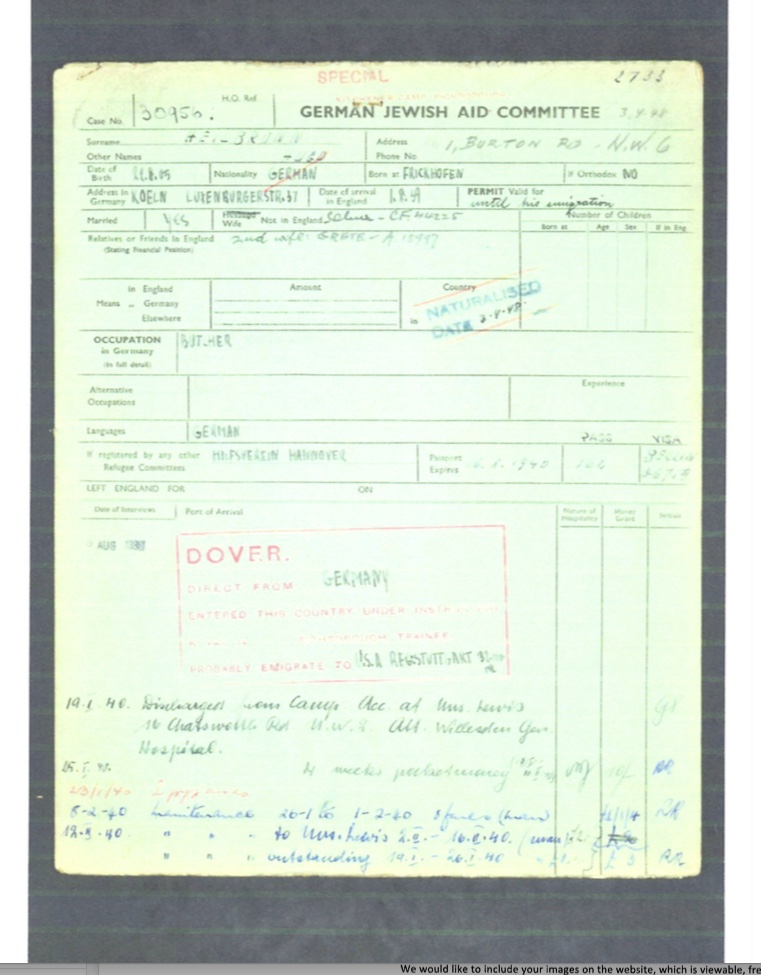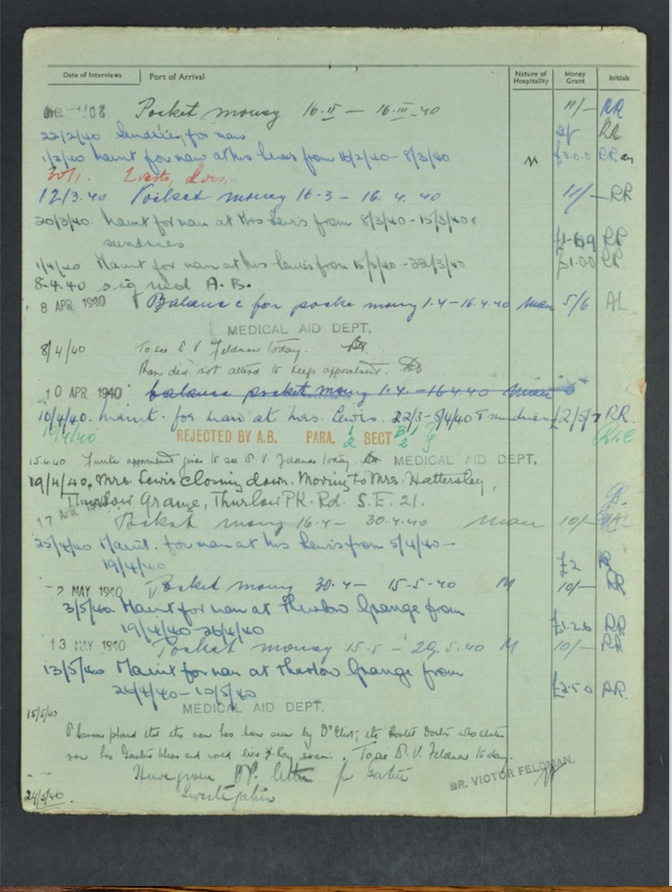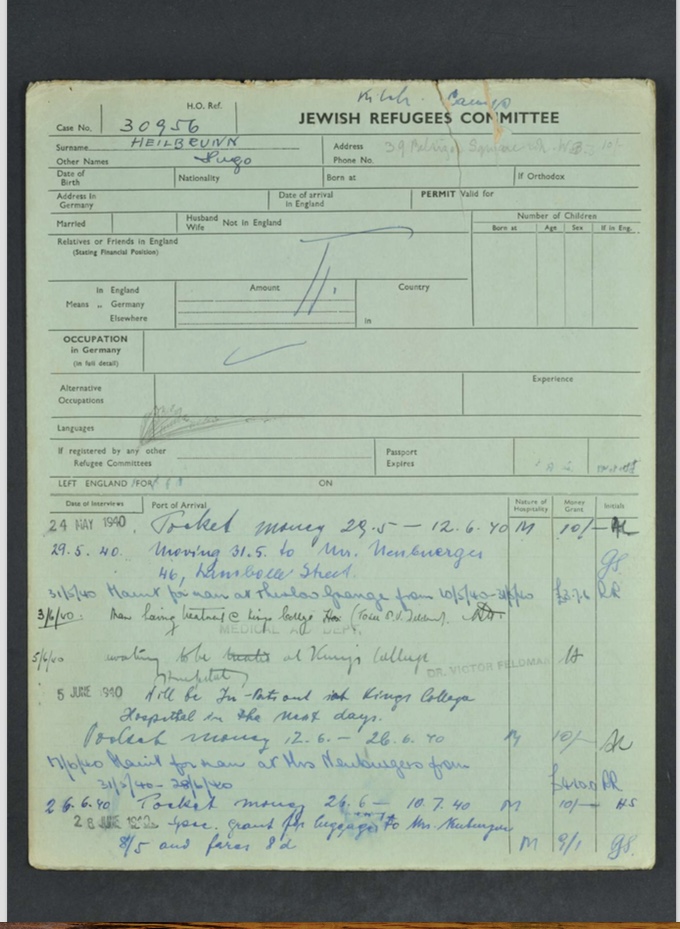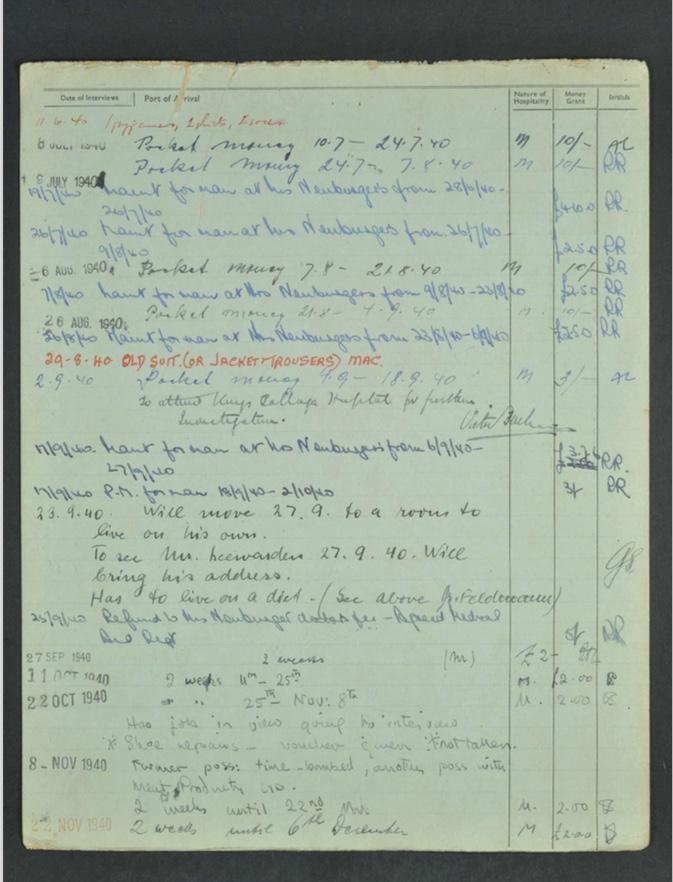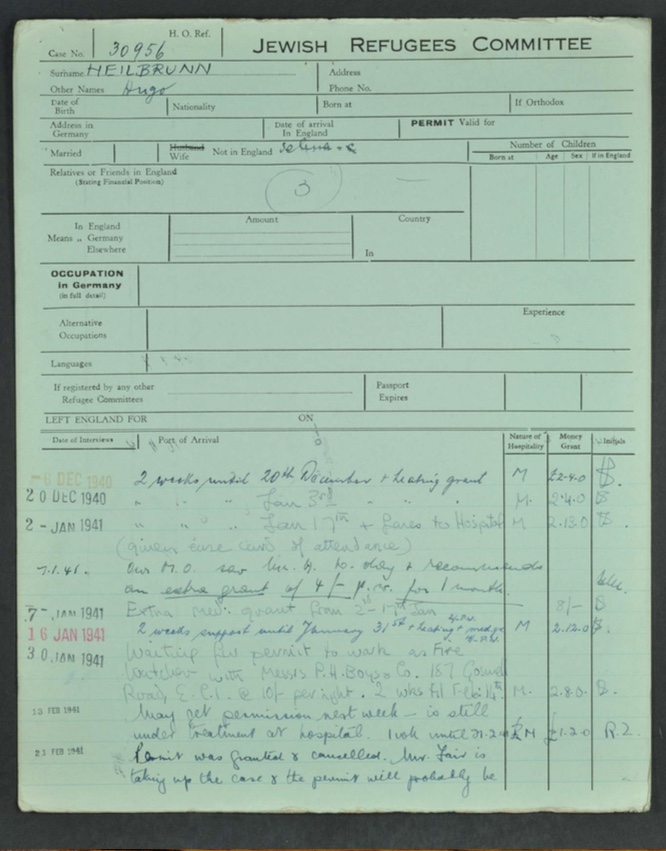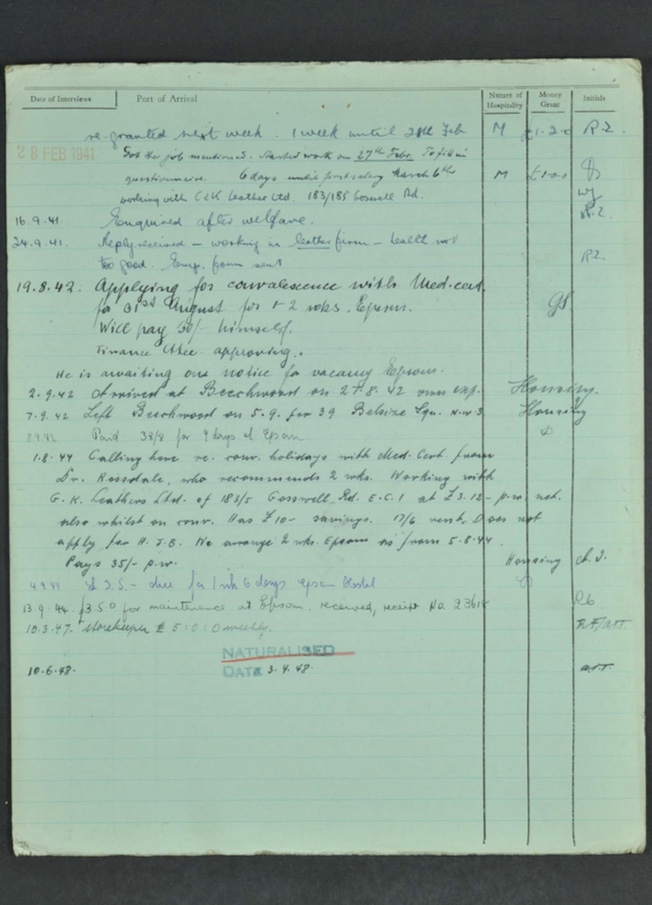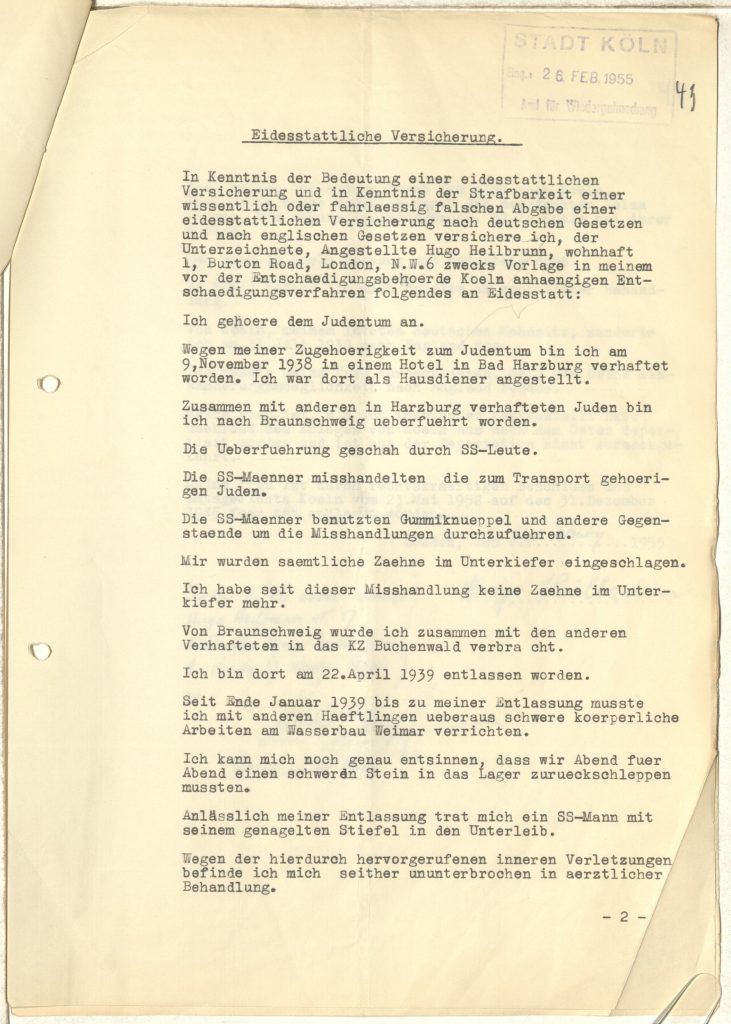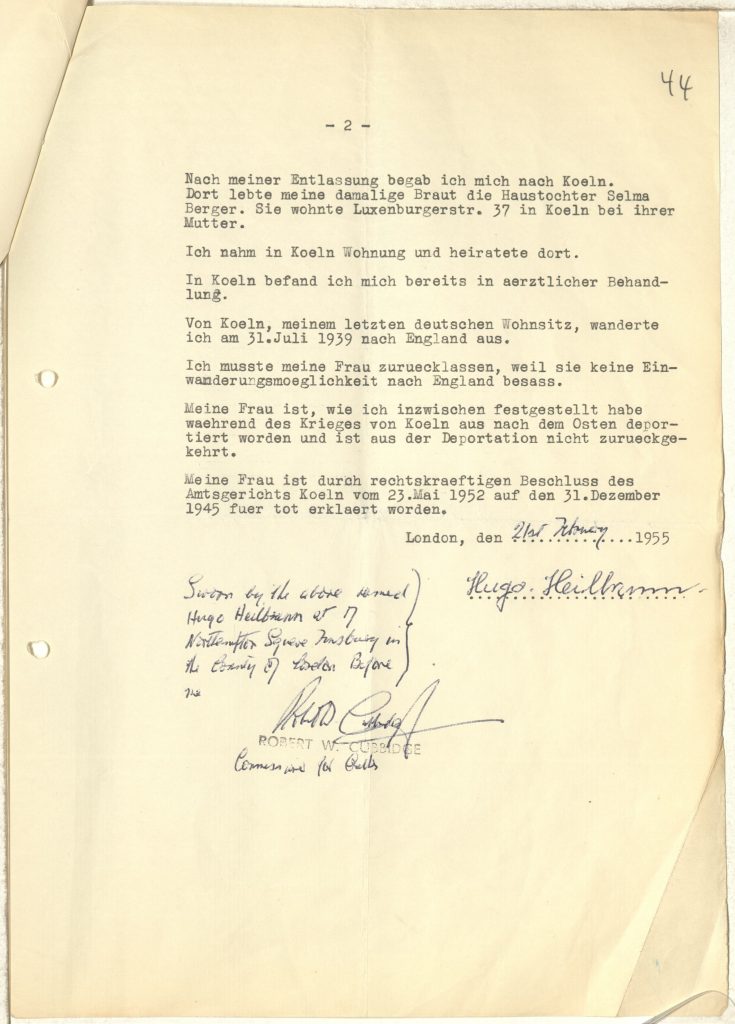Born: Frickhofen (now Dornburg), Hesse, Germany, on 22 August 1905
Profession in country of origin: Livestock trader
Arrived in Britain as a refugee from Germany on 1 August 1939
Documents
Male enemy alien - Exemption from internment - Refugee
Surname: Heilbrunn
Forename: Hugo
Alias: -
Date and place of birth: 22/08/1905 in Frickhofen
Nationality: German
Police Regn. Cert. No.: 712 474
Home Office ref: C 804
Address: Kitchener camp, Richborough, Sandwich, Kent
Normal occupation: Cattle dealer
Present occupation:
Name and address of employer: -
Decision of tribunal: Exempted "C"
Date 18.10.1939
Whether exempted from Article 6(A): Yes
Whether desires to be repatriated: No
Richborough camp tribunal no. 2
Source: National Archives, Home Office: Aliens Department: Internees Index, 1939-1947.
Editor’s note: We are not allowed to reproduce National Archives (UK) images, but we are permitted to reproduce the material from them, as shown above.
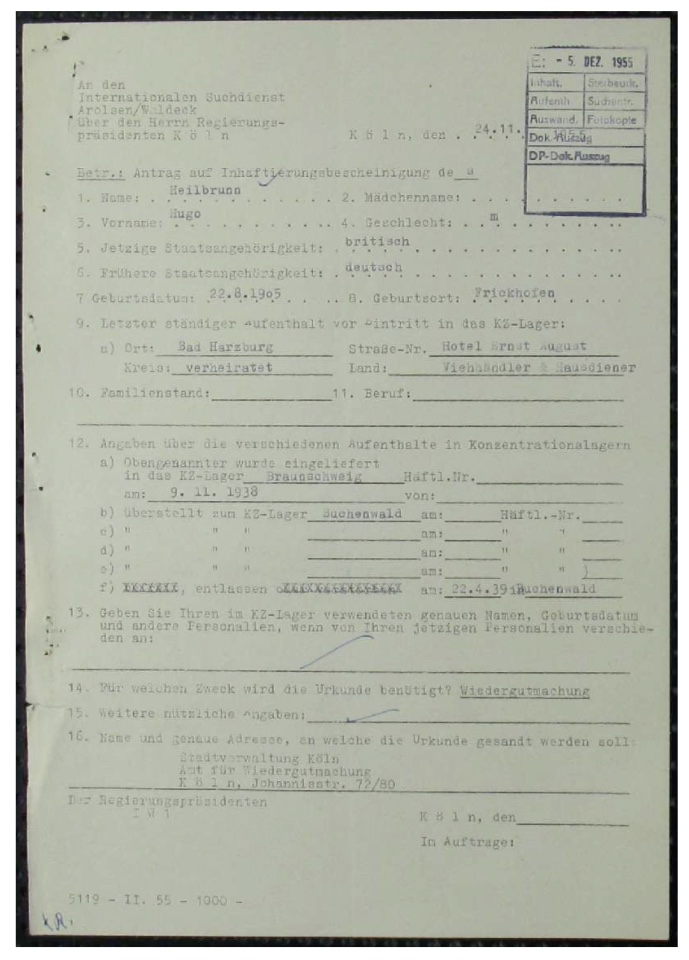
Record of arrest on Pogrom night 1938 at the Hotel Herzog Ernst-August, Bad Harzburg.
To view the following images, please click to open in enlarged full form
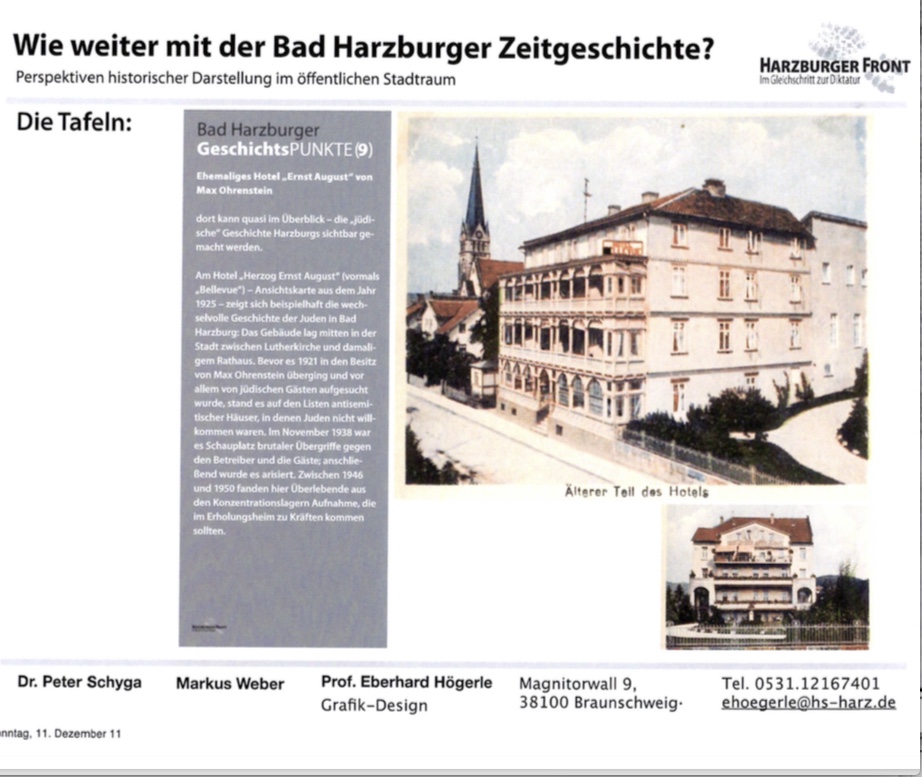
Translation into English of the text above (very kindly submitted by a Kitchener descendant) Bad Harzburg, points in history The Jewish history of Harzburg can ostensibly be seen at a glance at Max Ohrenstein’s former Hotel “Ernst August”. The Hotel “Herzog Ernst August” (formerly the “Bellevue”) – as shown in a postcard from 1925 – exemplifies the eventful history of the Jews in Bad Harzburg. The building was situated in the town centre between the Lutherean church and the former Town Hall. Before it came into the ownership of Max Ohrenstein in 1921, and especially before being visited by Jewish guests, it sat on the list of anti-semitic houses in which Jews were not welcome. In November 1938 it was the scene of brutal attacks against the operator and guests: it was subsequently aryanized. Between 1946 and 1950, survivors of the concentration camps were admitted here to recover at the convalescent home.
Hugo Heilbrunn, ITS file, Prison list. WolfenBüttel prison arrest intake list for Jews from the Pogrom Nacht round up.
Peter adds: “Part of the prison had an execution wing where convicted prisoners were guillotined. It is located south of Braunschweig. See the prison memorial site”
The image was sent to the family by Marcus Weber and submitted by Peter Heilbrunn for his late father Hugo Heilbrunn.
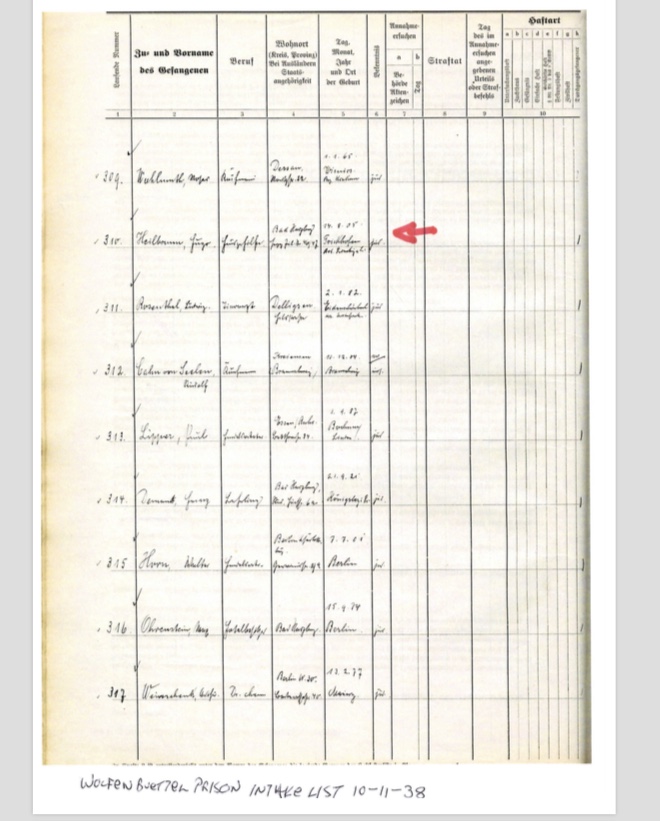
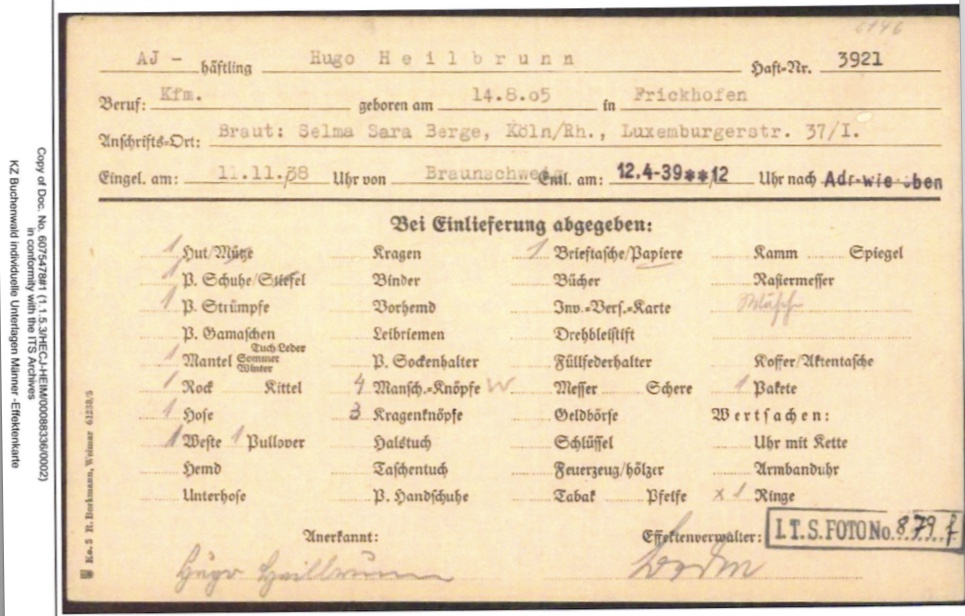
Kitchener camp, Hugo Heilbrun, ITS file, Buchenwald KZ, List of possessions taken on entry to the camp, 11 November 1938, Prisoner number 3921
Peter adds –
- The list of possessions is interesting for a couple of reasons:
- The day of birth is wrong
- Selma, his future wife, is referred to as Braut which I took to be bride. This cannot be true as he only married in June 1939. Perhaps it means betrothed.
- What isn’t clear is the point in time to which the list refers. Judging by the different coloured ink, I assumed it was completed on Hugo’s arrival and subsequently updated with his release details. However, I was told that Pogrom prisoners were not issued standard camp clothing given they were not intended to stay long. My father did, however, remain an unusually long time, so perhaps he was issued prison clothes. Either way, it may be that Selma sent some and hence the package document. Alternatively, her package might have contained money and documents in order for him to arrange his release.
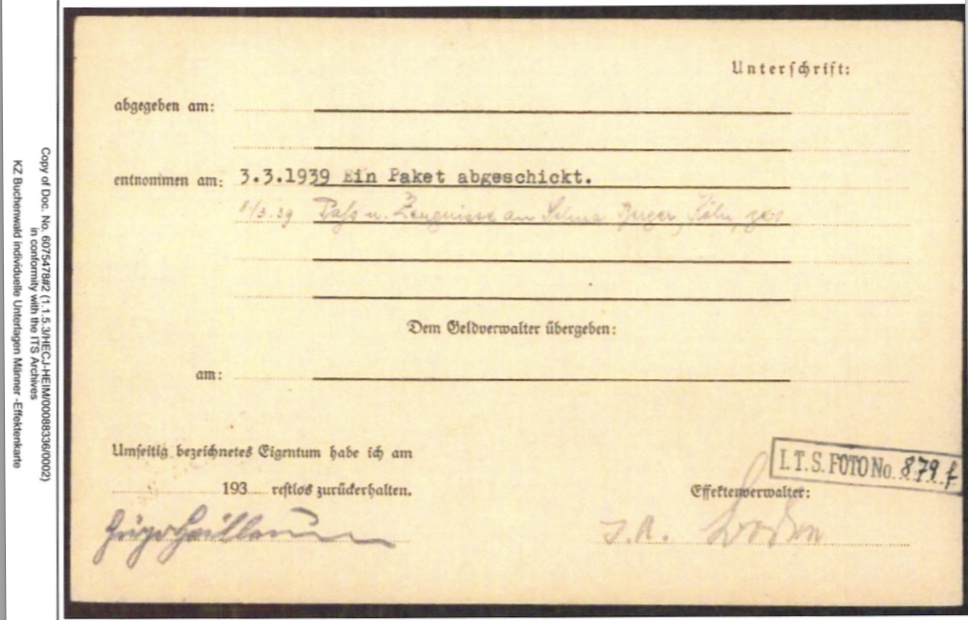
Source: ITS file, Bad ArsolenHugo Heilbrunn, ITS file
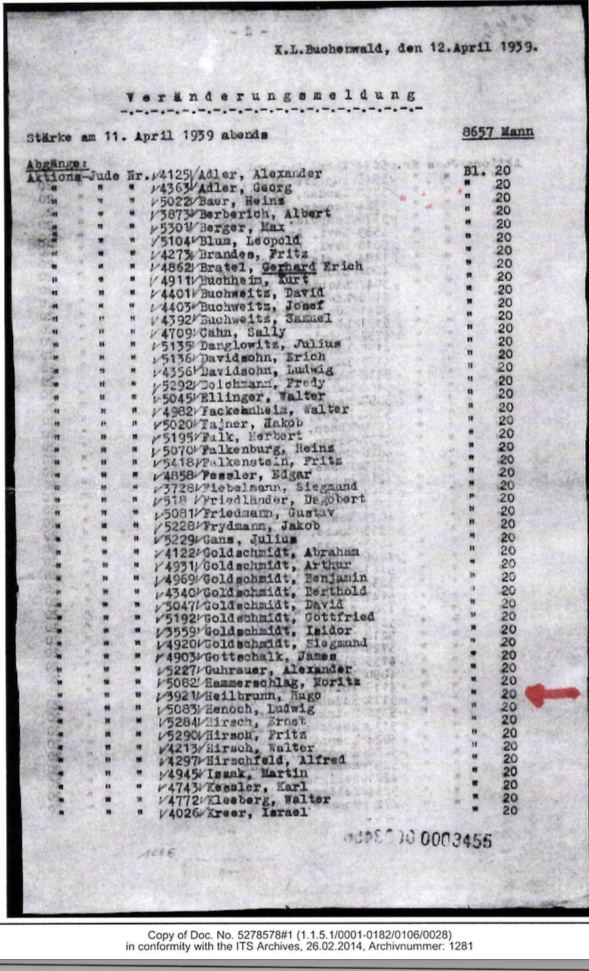
Hugo Heilbrunn, ITS file, Buchenwald KZ, 11/12 April 1939
Peter adds:
“This list is, I believe, the evening headcount of prisoners in hut 20. My father was released the next day. It shows that there were still 8657 prisoners in the camp – presumably Jews. The camp had a fenced of section for Pogrom detainees. Apparently over thirteen thousand were shipped on 103 transports in the three days following Pogrom Nacht.”
For a history of Buchenwald, Peter recommends Buchenwald Concentration Camp, 1937-1945, edited by the Gedenkstätte Buchenwald, compiled by Harry Stein, published by Wallstein Verlag, ISBN 978-3-89244-695-8 (2005).
Translation of the above affidavit
Affidavit given by Hugo Heilbrunn in February 1955 in relation to his claim for compensation from the German State. With knowledge of the meaning of an Affidavit and of the penalty for giving false witness under both British and German law, I the undersigned Hugo Heilbrunn living at 1 Burton Road, London NW6 give the following statement regarding my claim lodged with the Compensation authority in Cologne. I am Jewish. Because of my religion, I was arrested on November 9th, 1938 in a hotel in Bad Harzburg. I was employed there as a porter. Together with other arrested Bad Harzburg Jews, I was arrested and taken to Braunschweig This arrest was undertaken by SS personnel. The SS personnel abused the Jews being taken to Braunschweig. They used rubber truncheons and other methods to inflict this abuse. All the teeth in my lower jaw were broken. Together with those arrested, we were transported to KZ Buchenwald. I was released from there on 22nd April 1939. Since the end of January until my release, I, together with others was forced to carry out hard labour at the waterworks in Weimar. I can well remember that night after night, we had to drag a heavy stone back to the camp. On my release an SS man kicked me in the abdomen with his hobnailed boot. Because of this internal injury I have been constantly under medical care. After my release I went to Cologne to my fiancé Selma Berger. She lived at 37 Luxenburgerstrasse with her mother whom she cared for. I lived in Cologne and got married there. I secured medical treatment in Cologne. From Cologne, my final German address, I emigrated to England on 31stJuly 1939. I had to leave my wife behind as she had no visa to come to England. As I have since discovered, during the war, my wife was transported east and did not return. My wife was legally declared dead as of 31 December 1945 by the Cologne District Court on the 23rd May 1952
All documents and translations submitted by Peter Heilbrunn for his late father Hugo Heilbrunn.
Memories
Hugo Heilbrunn, Kitchener Camp (1 August 1939 to 22 January 1940).
My father was born on 22 August 1905 in Frickhofen (now Dornburg), Hesse, Germany. He was educated in the local school for eight years. The village had six Jewish families; my father’s ancestors can be traced back to the mid eighteenth century. All appear to have been Viehhaendler (livestock traders), except for his father Samuel who was a Metzger (butcher) and supplied the local Jewish community with Kosher meat.
Hugo’s father was married twice. Hugo had a total of five step-siblings and an elder sister. Upon his father’s death in 1927, Hugo sold the family home, apparently moved away, and plied his Viehaendler trade around the Cologne area, venturing as far as the Dutch border at Brüggen. I know nothing of his life during this time, but at some point, he met his future wife Selma Berger. He did tell me that he conducted his business at night, driving cattle to the next-day market for friendly farmers who left their animals in their fields.
I pick up my father’s trail on 9 November 1938, when he is arrested at the Hotel Herzog Ernst August, formerly the Bellevue, in the spa town of Bad Harzburg in the Harz mountains. How he came to be there I have no idea. His arrest papers refer to him as servant. The hotel was a popular Jewish-owned and Jewish-run establishment in the 1920s and 1930s. Along with other occupants of the hotel, including a wedding party, he was taken to the Rathaus where other detainees were assembled. The women and children were sent home, and between fifteen and twenty men were transferred by the Braunschweig Gestapo to Wolfenbüttel prison where they joined a further 130 men. On the 11November, Hugo, together with his companions, was transferred to Buchenwald KZ, where he remained until 12 April 1939. Given the NS policy at the time, Hugo spent far longer in Buchenwald than most of the detainees. This may be because he lacked money and or documents to arrange his release.
Upon release from Buchenwald, Hugo returned to Cologne, presumably to the house that Selma shared with her married sister at 37, Luxemburger Strasse; this is shown on their marriage certificate dated 6 June 1939. I do not know how my father availed himself of the ability to leave Germany, other than through the usual RV channels. The plan was that he would sail to New York via England and then arrange for Selma to follow. This is how he came to be in Kitchener camp, where he arrived on 1 August 1939, presumably having reached Dover the same day. He is listed at this location on the 1939 special census. Sadly, the War intervened, and he was not able to make the crossing from Liverpool. His wife remained in Germany and died in the Holocaust; she was sent to the Łodz Ghetto in 1941 and was murdered in nearby Chełmno in 1942, along with her mother, brother, and twin sister’s family.

For my father, at 37 Luxembugerstrasse, Cologne
My father didn’t tell me much about his time at Kitchener Camp other than that he was in ill health when he arrived and that he helped out on farms – it was harvest time in the orchards. Unlike some others, Hugo was allowed to leave and move to London, which he did on 22 January 1940. I believe he stayed with a relative. He moved three times during 1940, ending up at 39 Belsize Square, where he had his own room and where he remained for over five years. He spent much spare time at the Cosmo café where he became a regular Sunday morning customer well into the 1960s.
In London, he found work as a warehouseman in a small company called G&K Leathers Ltd, based on Goswell Rd, London. From doing family research, I discovered that he was a distant relative of Mr F Gutenstein – the G in the company’s name; the other owner being a Mr Kissin. Both were exiles from Germany and came over well before my father. He remained there until he retired in 1970. I think the reason he remained there is that his poor English and is inability to write in the Latin script held him back. I grew up in a household which spoke only German and was my father’s official scribe.
During those early years in England, the German Jewish Aid Committee supported him. Emerging from the records, it is clear that he was in ill heath and that he was a firewatcher.
He met my mother during the war as she too lived in Belsize Square and, at some point, apparently worked in Goswell Road. She had fled Vienna in April 1939 and was initially in domestic service in Herne Hill. She then trained as a power machinist and worked as such during the war. They married on Empire Day – 24 May 1946. They were naturalised in 1948.
Hugo died in 1988.
Submitted by Peter Heilbrunn for his late father Hugo Heilbrunn, 24 January, 2018

Stolperstein for my father at 37 Luxembugerstrasse, Cologne.
The stone was laid below that of his wife and her family who all perished in the Holocaust.
While cruelly separated in 1939, they are now side by side again – 80 years later.
Your recent post mention what impact the Trading laws had on business activity. Between July 1932 and November 1937 my father had made a living as a self-employed cattle dealer in Brueggen, NRW. On the 22nd November 1937, as a consequence of the banning of business with Jews, the Herrn Landrats in Kempen, withdrew his licence to trade. Between 1933 and 1937 the laws relating to trade with Jews made his income less and less so that by 1937 he could not cover his costs.
I recall that during these latter years, he told me that he was forced to conduct his business clandestinely. Sympathetic farmers would leave their cattle in a nearby field. My father would collect them and drive them to market overnight. At the market he had a non-Jewish friend who would handle the sale and possible purchase of new stock. Again this would be held until night time when they were driven back to the farmer’s field. Financial settlement would take place the next day. Clearly this was a dangerous thing to do. He could have been arrested at any time had the authorities been informed. It say much for his relationship with the local farmers that this did not happen.
As a consequence of losing his Trader’s Licence, he had to rely of support of the Brueggen Community for which he had to do street cleaning work and such. After much trouble, he was able to secure a position in May 1938 in the Palast Hotel in Wildungen which I assume was Jewish owned. I think he had the help of a relative in securing this position as Hausdienst. He remained there until 22.9.1938, when he entered the service of another Jewish owned hotel, the Hotel Ernest August in Bad Harzburg. In both hotels he earned 300 marks per month with free board and lodging. On 9th November 1938 he was arrested at this hotel and sent to Buchenwald.

This information was given under oath in September 1955 at the German embassy in London in pursuance of a claim for compensation. These documents which were among 552 I recently received are full of wonderful background information.
Submitted by Peter Heilbrunn for his late father Hugo Heilbrunn
Photographs
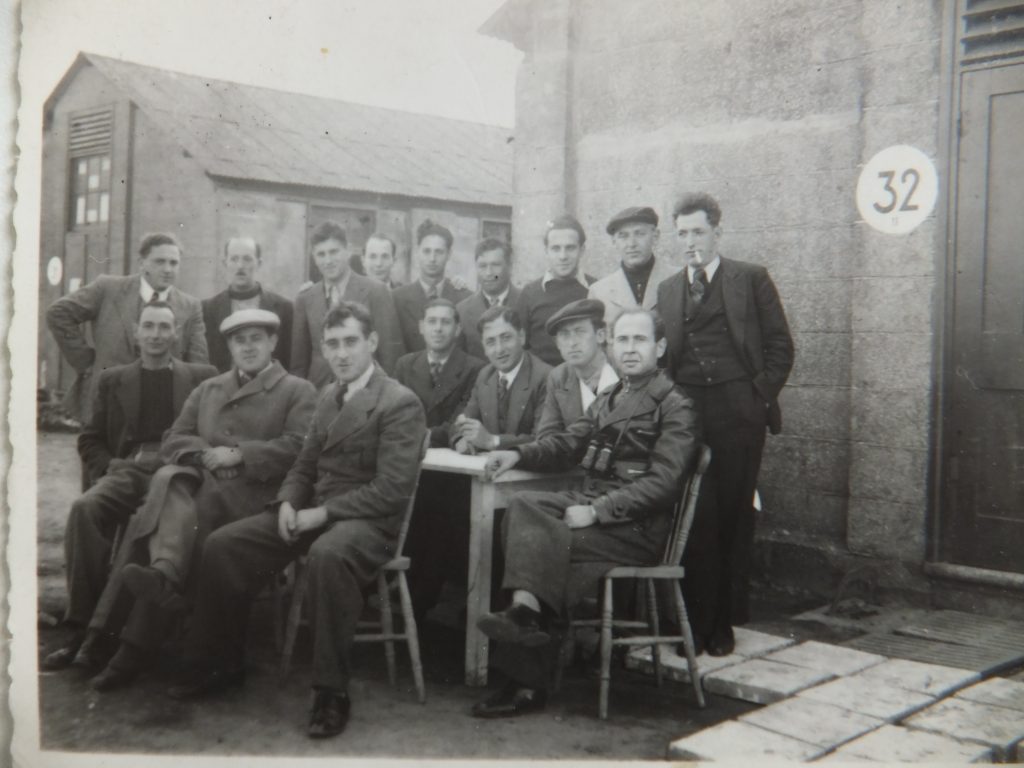
Submitted by Peter Heilbrunn for his late father Hugo Heilbrunn

